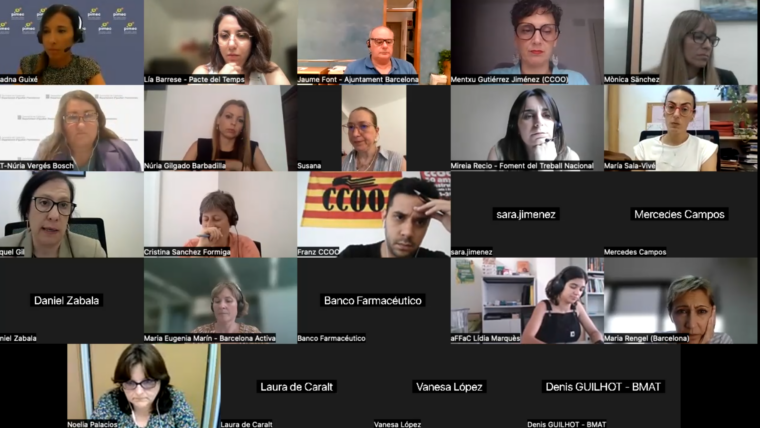Access the recording of the digital disconnection session
“Raising awareness among organizations and citizens and reinforcing shared responsibility were defined as the two major challenges of digital disconnection
On June 19, the Time Agreement organized the session “How to ensure digital disconnection in our companies?” based on the study “Guidelines for ensuring the right to digital disconnection,” published by the Council of Labor Relations of the Catalan Government.
Raquel Gil Eiroà, Councilor for Economic Promotion, Labor, Feminism, and Democratic Memory of the Barcelona City Council, was responsible for welcoming the speakers and attendees. The councilor highlighted how digital disconnection is framed in a context of technological acceleration that is invading all our labor relations. This context requires a constant review of policies and measures in organizations so that the technological dimension improves not only organizational productivity, but also the quality of life of workers.
Núria Vergés, Director General of Care, Time Organization, and Work Equity at the Department of Equality and Feminism of the Catalan Government, highlighted how the study “Guidelines for ensuring the right to digital disconnection” becomes the government’s and social agents’ recognition of the right to time as a “right of rights.” The director emphasized that this document emerged from social dialogue and a willingness to provide organizations with practical tools.
Unions and employers were also present to discuss the main challenges related to digital disconnection and the role of collective bargaining.
Mireia Recio Ortega, from the Department of Labor Relations and Social Affairs of FOMENT, began her speech by contradicting the widespread belief that digital disconnection can become an obstacle to organizational productivity and identified its impact on reducing stress, improving well-being, concentration and efficiency, creativity and innovative capacity, personal satisfaction, and reducing digital fatigue among workers.
Ariadna Guixé, head of Labor Relations and Collective Bargaining at Pimec, wanted to highlight different factors that can condition the application of the right to digital disconnection and that are linked to a very heterogeneous market; differences in technological dependence according to sectors of activity and organizations, relationships with external subjects (clients, users, etc.), the size and resources of the company, the degree of autonomy and flexibility of workers, total or partial service provision, etc. She also emphasized the role of collective bargaining in reducing the current legal uncertainty surrounding the concretion and materialization of the right to digital disconnection.
From the unions, Mentxu Gutiérrez Jiménez, Secretary of Women and LGTBI+ Policies of CCOO Catalonia, and Núria Gilgado, Secretary of Union Policy of UGT Catalonia, both participated, coinciding on the need to develop the right to digital disconnection in collective agreements, considering that no more than 8% of agreements currently have any clause on this matter. Additionally, CCOO highlighted the importance of including the right not to receive communications, which goes beyond the right not to respond outside working hours, as well as the challenges posed by telework when used as a tool for individualizing labor rights. The UGT representative put forward the importance of identifying urgent situations and extraordinary circumstances for contacting outside working hours so that these are not tied to organizational discretion.
In the final part of the session, different entities from the Time Agreement and the Network of Companies for a New Work Time (XNUST) participated, sharing their experience in promoting good practices in digital disconnection. Susana Pascual García, from ACEFAT, explained the participatory and transparent process that was promoted in 2019 for the development of a digital disconnection regulation, while Mónica Sánchez, from CRITERIA, highlighted how her organization’s digital disconnection regulation specifically identifies urgent and extraordinary circumstances.
The various interventions and concerns of the more than 30 participating entities and organizations identified the two key challenges that should guide the strategic work lines in the field of digital disconnection: awareness and strengthening the shared responsibility and commitment of public institutions, organizations, and citizens in the challenge of digital disconnection to move towards a healthier, more equal, efficient, and sustainable new time culture.
If you were unable to participate in the session but want to recover its content, you can watch the session recording.

